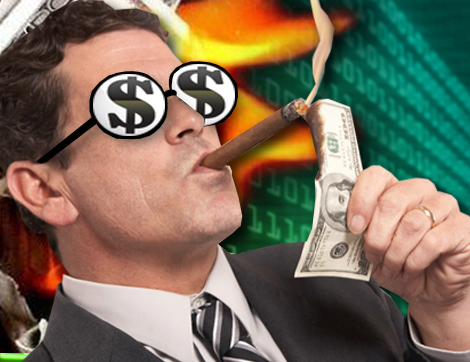
By Bill White —
The long-time globalist ideal of a cashless world is moving forward, inspired ironically by a digital currency designed as an alternative to private usury banks. The Bank for International Settlements, whose members include 60 nations’ central banks, issued a report in December urging its component banks to consider this idea, and several seem eager to embrace the possibility.
“Perhaps central bank money is ripe for its great technological leap forward,” said Andrew Haldane, chief economist for the Bank of England, in a September 18, 2015 speech on the issue.
Particularly important for Haldane was using such a currency to enforce negative interest rates, which can be evaded now by withdrawing physical cash.
The issue is being pushed particularly strongly in Europe by Jonathan Dharmapalan, whose electronic currency mint company based in Dublin, Ireland is marketing digital currency technology to central banks. According to Dharmapalan, he is currently in discussion with 30 central banks about his technology, and two banks are preparing to issue his cashless currency.
Another bank thinking of changing over is the Bank of Canada.
“We have to envision a world in which people mostly use e-money [or electronic money],” senior deputy governor Carolyn Wilkins said in a November 2015 speech endorsing the idea.
The United States Constitution says that “Congress shall have power . . . to coin money, regulate the value thereof” and that U.S. states “shall use no legal tender but gold and silver.” These clauses were adopted as a specific rejection of the Bank of England, founded in 1694, that had dominated the English-American economy before the American revolt of 1774-1783.
However, global bankers who threaten the world with usury have caused that clause of the Constitution to become a dead letter. In 1913, the world’s banks—most of them affiliated with the Rothschild family—met in Georgia at Jekyll Island to create the Federal Reserve System. While the old American financial system depended on a central mint and a patchwork of disorderly local banks, the new system quickly made the U.S. Treasury Department obsolete, acting as a vacuum cleaner to suck up the money of America’s working people.
The Federal Reserve transitioned the U.S. from a commodity-based currency system to a fiat system. But instead of a state fiat system, where the bank is owned by the state and currency volume is determined by tax and spending policy, the Federal Reserve is a private system in which currency volume is determined by interest rates. Banks create money by loaning it into existence, instead of issuing it, and then allow interest compounding to draw all of the wealth in the system into their hands.
Emigrate While You Still Can! Learn More . . .
In Europe, the failure of continental socialism has led to declining standards of living, like in the U.S. under Obama. Rather than address the problem, with its roots in cultural demoralization, the European Central Bank and its components are trying to stimulate the economy with negative interest rates. Every month, rather than pay interest, banks take money from their customers’ accounts. The theory is that this forces people to spend money. But, really the insecurity that it creates forces consumers to abandon the banking system, withdrawing money in cash.
Hence the interest in digital currency. In a world where there is no cash, people must use the banking system to buy and sell, and then these same people have to accept negative interest rates. More concerning, if a central bank wants to simply confiscate all money, people would have no choice but to have their accounts drained, because there would be nothing in them but numbers. There would be no actual currency or a commodity like gold.
Ironically, Bitcoin—which is an interest-free currency issued by no one in particular—has shown that digital currency can work. In the past, when people have tried issuing private currencies backed by silver and gold, like the liberty dollar, governments have forcefully confiscated the money and arrested its users. Bitcoin, however, lacking a central repository, cannot be so easily shut down. This is why governments want to clone its novel digital identity, issuing something that looks like bitcoin while restoring to it the usury that makes them rich.
Bill White is a freelance journalist and publisher based in Virginia. He has also written articles for THE BARNES REVIEW (TBR) magazine. Bill is also the author of a new book entitled National Socialism: Yesterday & Today. Proceeds go to White’s legal defense fund.


1 Comment on Cashless World to the Benefit of World’s Central Banksters